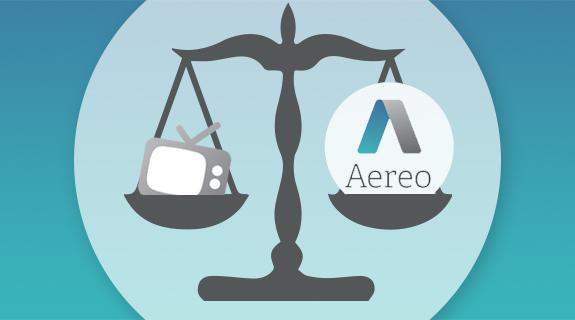After months of litigation in several different states, all of the players in the ongoing Aereo legal drama have their big day at the U.S. Supreme Court on Tuesday, starting the countdown clock to a final ruling that will ultimately decide whether the service will survive.
With so many developments along the way, you’d be forgiven for forgetting exactly what was at issue in the Aereo case. Here’s our brief primer on everything you need to know as the broadcasters and the streaming service battle it out at the High Court.
What is Aereo?
Aereo uses arrays of tiny antennas to grab broadcasters’ signals and stream them over the Internet to subscribers who pay a minimum of $8 per month. In addition to streaming live TV, Aereo offers remote DVR storage, but with the programs kept on Aereo’s servers rather than on a home DVR unit. The number of storage hours you get per month changes depending on what you pay. Aereo is backed by IAC and Barry Diller.
Where can people subscribe to Aereo?
Aereo is available in Austin, Houston, San Antonio, Dallas-Fort Worth, Boston, Miami, Detroit, Baltimore, and Cincinnati. The company halted signups in New York City and Atlanta due to “high demand.” Legal setbacks in Utah meant that customers in Denver and Salt Lake City lost access to Aereo’s service.
So who is suing Aereo?
All of the major broadcasters: Disney, CBS, Comcast, WNJU, WNET and Thirteen Productions, Fox, WPIX, Univision, and the Public Broadcasting Service.
What’s the issue?
The specific question before the High Court is “whether a company ‘publicly performs’ a copyrighted television program when it retransmits a broadcast of that program to thousands of paid subscribers over the Internet.”
In layman’s terms: The broadcasters say Aereo is violating their copyright by not paying for the signals. Aereo argues that those signals are provided free over-the-air for anyone with an antenna, so Aereo is just doing that on its customers’ behalf.
For a much more in-depth preview of the exact legal argument, head over to the expert Supreme Court watchers at Scotusblog, who break down both sides of the case.
What’s Aereo’s response to the broadcasters?
From their recently-launched PR website:
“At Aereo, we believe that technology can play a vital role in making people’s lives better. So, we set out to build a technology that was simple and useful, combining the well-known consumer antenna and DVR and the power of the Internet and cloud computing. The results: Aereo’s unique cloud-based antenna and DVR technology.
Aereo’s technology provides a consumer the ability to use a remotely located individual antenna to access free-to-air broadcasts, make a personal copy of a program on a remote DVR and play back that copy only to him or herself. Using the cloud, Aereo was able to develop a smarter, more sophisticated antenna, purpose-built for the 21st century consumer.”
Who is siding with the broadcasters?
The Obama Administration. And that isn’t exactly a good sign for Aereo. The Obama Administration filed an amicus brief supporting the broadcasters, and the Justices granted the administration permission to argue against Aereo during Tuesday’s argument. Court observers say the U.S. Solicitor General’s input is likely to be “highly influential.” Not a great sign for Aereo. The government will be granted 10 minutes on Tuesday, but it won’t be the current Solicitor General or his principal deputy making the government’s case—they’ve both recused themselves. The most likely person will be Deputy Solicitor General Edwin Kneedler.
What have the lower courts said?
Well, here’s the thing: the case’s core issues haven’t even been heard yet. But judges in several jurisdictions have been asked to rule on injunctions blocking the streaming service from operating. Aereo won in Boston and New York, where judges refused to shut the service down ahead of a trial. But a federal judge in Utah sided with the broadcasters, which put a stop to signups in Salt Lake City and Denver.
What happens if Aereo loses?
“If we lose, we’re finished,” Diller told Bloomberg Television’s “Market Makers” program earlier this month. “It’s very possible there’s some salvage. But Aereo probably, as I say probably just because I can’t—I can’t see any path forward. It probably would not be able to continue in business.”
There’s a side issue that some, such as the Consumer Electronics Association and other technology-interest groups, worry about if Aereo loses: the decision could put a serious legal dint in cloud computing, because Aereo essentially acts like a DVR that’s stored in the cloud and a decision against Aereo would raise a legal question around similar cloud-based services.
What happens if Aereo wins?
Broadcasters—led by News Corp. COO Chase Carey—have been threatening for a year that they would turn the free over-the-air broadcast networks into pay-cable services if Aereo’s streaming TV service is allowed to go forward. That may be an idle threat, but other broadcasters, including CBS CEO Leslie Moonves, have backed Carey over the past year.
When will the Justices rule?
A decision is expected in June.
And that will be the end of the Aereo saga?
Are you kidding? We’re gonna let Deadline answer this one: “The world is filled with clever lawyers, lobbyists, and entrepreneurs. If broadcasters lose, then don’t be surprised if they ask Congress to change the law to make services like Aereo illegal. And if Aereo loses, either it — or someone else — could look at the rationale behind the Court’s decision and then engineer a service that would still stream free TV in a way that complies with the new guidelines.”
Read More: Brief, Scotusblog, The Hollywood Reporter, Deadline, AdWeek
Brief Take: It could be The Case That Changes TV Forever, and it’s finally at the High Court. Tuesday starts the countdown clock to a decision in a case that has gripped the broadcast industry since Aereo arrived on the scene.
Tags:













































__twocolumncontent.jpg)











